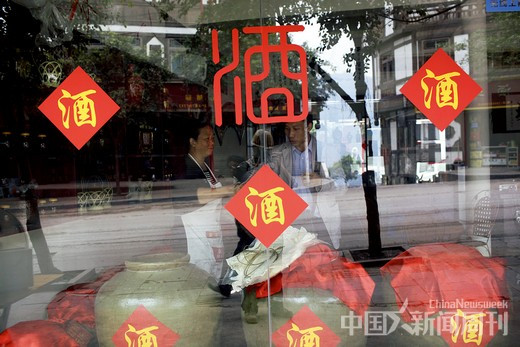
(Ecns.cn) -- Renhuai, a county-level city in the southwestern province of Guizhou known for manufacturing China's top white liquor Maotai, is now facing uncertainty about its future, reports China Newsweek.
Long plagued by inferior wine producers poaching the Maotai brand name, the city is now up against a new problem: a shortage of land.
For years, profits made from liquor have far exceeded those made from the real estate market in Renhuai, leading the local government to take risky steps to develop the spirits industry. Its most notable indiscretion is an ever-expanding industrial park launched in April 2010 that has put it at odds with local farmers.
'Great leap forward'
Earlier this month, Li Yumin (not his real name) squatted in front of a makeshift house built by the Sanhe township-level government in Renhuai and watched the construction site about a hundred meters away. It's the place where his home used to be.
To cooperate with the industrial park's construction plan, Li signed an agreement with the government in March of last year to sacrifice his house for a payment of about 120,000 yuan (US$18,900).
In the agreement, the government also promised to allocate a chunk of land for new homes for relocated residents, but no one has heard anything about it yet, complained Li, adding that an increasing number of local residents feel they have been cheated.
Yu Zhengyong (alias) is one of them. Yu sent a copy of the agreement to a city-dwelling relative who happens to be a lawyer. After reading it, the lawyer told Yu that the land would never be used for agriculture again.
According to China's national policy, the nature of collective land ownership and use cannot be changed during transfer of contract titles, and farmers' interests must be protected. The Sanhe government seems to have forgotten this.
In China, urban land is owned by the state, but collective land belongs to farmers. If the Sanhe local government needs to use arable land for construction, it must apply for a change of land-use purpose and wait for approval, notes China Newsweek.
The procedure usually takes a very long time, so local governments sometimes use arable land for construction before receiving approval, revealed Yang Zaiming, a Beijing-based lawyer specializing in demolition and resettlement.
According to a local farmer, the Sanhe government once responded that the approval procedure was still ongoing, but that construction would start immediately.
In a miniature "Great Leap Forward," the Renhuai government has already acquired over 300 hectares of farmland for the wines industrial park, part of which has still not been approved for construction.
Greedy for land
According to the original plan, the Renhuai wines industrial park will first cover 407 hectares. By 2015, when annual production of white spirits is forecast to hit 200,000 kiloliters, the industrial park would be expanded to cover an area of 1,025 hectares.
At the moment, however, the amount of "acquired" land cannot satisfy those needs, said Chen Lianzhong, an official at the news office of the publicity bureau in Renhuai. And with more enterprises willing to enter the industrial park, land for construction is far from sufficient, he added.
Yet according to guidelines released by the National Development and Reform Commission (NDRC) in 2011, white spirit and alcohol production lines are among the "limited" industries, China Newsweek reports.
Even more surprisingly, an official from the NDRC has said that applications for new land for alcohol production will be turned down.
Money talks
According to statistics released by Tonghuashun, a stock analysis software company, liquor made by Kweichow Maotai Company had the highest gross profit margin of 91.57 percent in 2011, and has maintained a gross margin higher than 90 percent for many years.
The high profitability of liquor has caused the Renhuai government to exert much effort to attract investment from home and abroad, building itself up as a "capital" of Chinese spirits and pushing projects such as the wines industrial park.
In 2011, HNA Group decided to spend about 800 million yuan (US$126 million) to acquire a 60 percent stake in Guizhou Mellow Wine, a brand known as "Maotai the second," which led to a climax of investment. That plan was later cancelled.
Nevertheless, currently more than 40 enterprises valued each at over 100 million yuan (US$15.8 million) have set up at Renhuai's industrial park; another 60 are on the waiting list.
Meanwhile, the problem of inferior liquor bottled under brand name labels remains a major headache for the industry. Last month, an investigative report aired on China Central Television exposed an inferior wine production chain located near the Kweichow Maotai Company that was using authentic labels obtained by Maotai insiders.
According to China Newsweek, fake wine production continues to evolve into a serious underworld "profession" supported by a constantly maturing supply chain.

Copyright ©1999-2011 Chinanews.com. All rights reserved.
Reproduction in whole or in part without permission is prohibited.